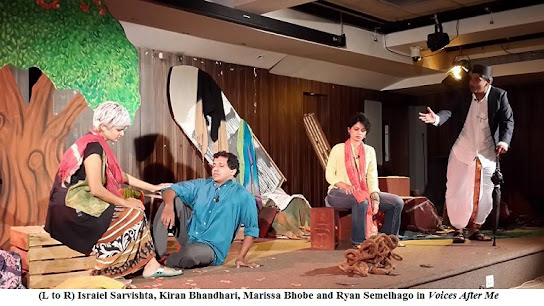A Journey through History and Subjective Realities (Play Review)
Voices After Me by the Mustard Seed Art Company, is probably one of the most intellectually stimulating plays performed in recent times on a Goan stage. The group of performers banded together by playwright Isabel de Santa Rita Vás and under the direction of Daegal Godinho and Celsa Pinto, staged a play that provoked the audience to question and appreciate the myriad thoughts, memories and subjective perceptions that shape us as human persons and in turn affect our relationships with other people.
The play, Voices After Me, was scripted by Isabel de Santa Rita Vás and took the audience through the reminiscences of Alice, a role adroitly performed by Israiel Sarvishta as she vacillates between ostensible madness and serene sanity. Rummaging through the debris of her home left behind by a gale, she collides with Durijesh, played by Kiran Bhandhari, who was very convincing with his innocent banter. The conversation between the two is rife with humour, which in no way mitigates the seriousness of the message to be sent across. Alice, an old woman, constantly derides Durijesh’s lack of comprehension with, ‘Limited vocabulary!’ as he repeats the last word of her statements. Both are searching for something precious from the past in the ruins, something that would palpably satisfy their inner turmoil. Durijesh’s quest is for his grandfather’s boat ‘Suvarna’ while Alice searches for the portrait of her husband. Alice slips back into the past, recalling her bridal exuberance, the attempts to tame her by the older women in her family, her hunger for her husband’s love and attention, her flirtations, loss, death and separation.
A new character enters in the form of the goldsmith, Premnath. Ryan Semelhago portrays a man who has lost his savings after investing in a defunct mine and can no longer afford to marry off his youngest daughter. Marissa Bhobe makes an entry as Marina, the daughter of Vincent the cook. Her father was a writer of tiatrs and short stories. Alice comically mimics a drunken Vincent singing a song that mocks corrupt politicians. Through the dialogue that ensues, Goa’s political history is traced in terms of Goa’s liberation, the Opinion Poll and the workings and demise of erstwhile Chief Minister, Mr. Dayanand Bandodkar.
The climax of the play reveals the existence of different realities and the tricks our memories and mind can play on us. Marina and Premnath are nothing but illusions. Each conjured up by the minds of Alice and Durijesh respectively. The resolution of the play follows with both Alice and Durijesh separating the ghosts from their present reality. Alice finds solace in the prospect of renewing her relationship with her son Anil and Durijesh makes peace with the idea that the boat is gone without the possibility of retrieval.
The play seems to delve beyond memories and thoughts but the state of affairs as they are today in Goa as a consequence of past events. The unawareness of the majority of the youth of the history of Goa is reflected in Durijesh’s ignorance. This emphasises that consequently the youth are unable to effect any tangible change. The broken down house could represent the rape of Goa due to various factors. The search for the boat could well denote a yearning for an identity shaped by the past. The finale sounds a note of positivity that there is hope yet. By refusing to be brought down by our mistakes, learning from them and keeping aside our subjectivity, we can still endeavour to create a better tomorrow.
(Originally published in November 2014)




Comments
Post a Comment